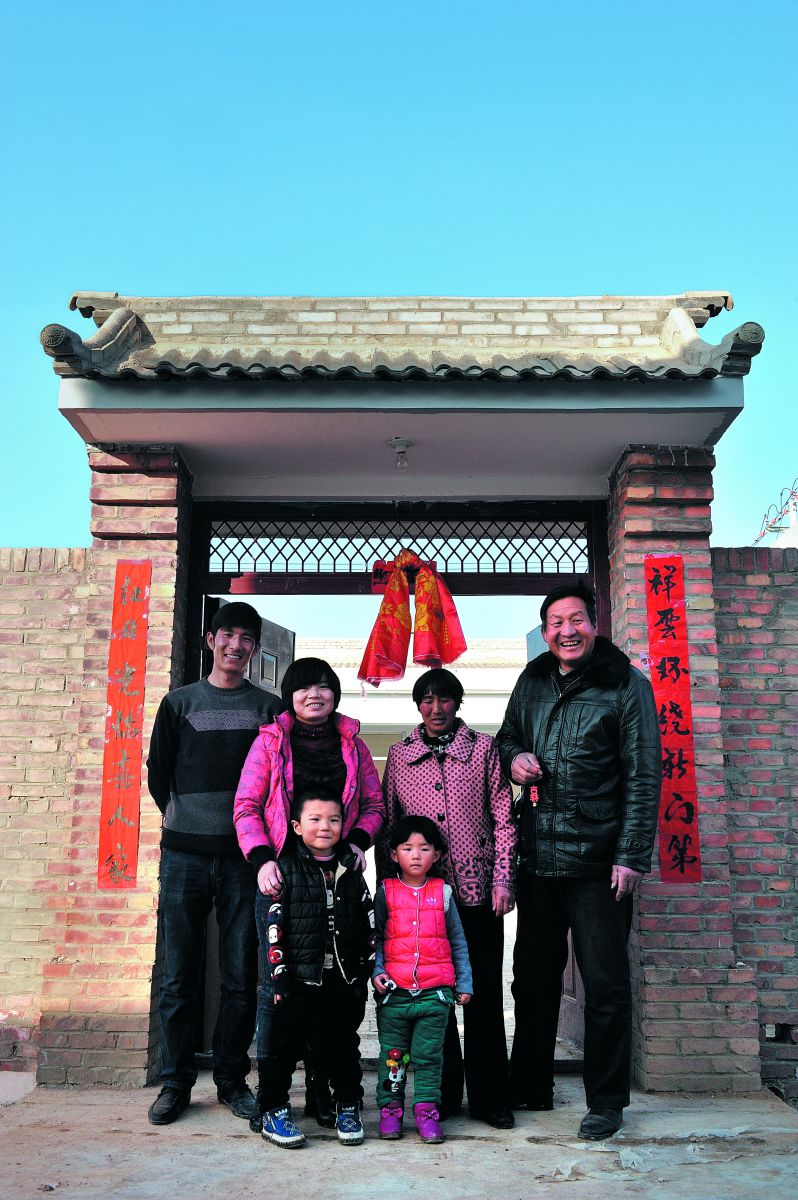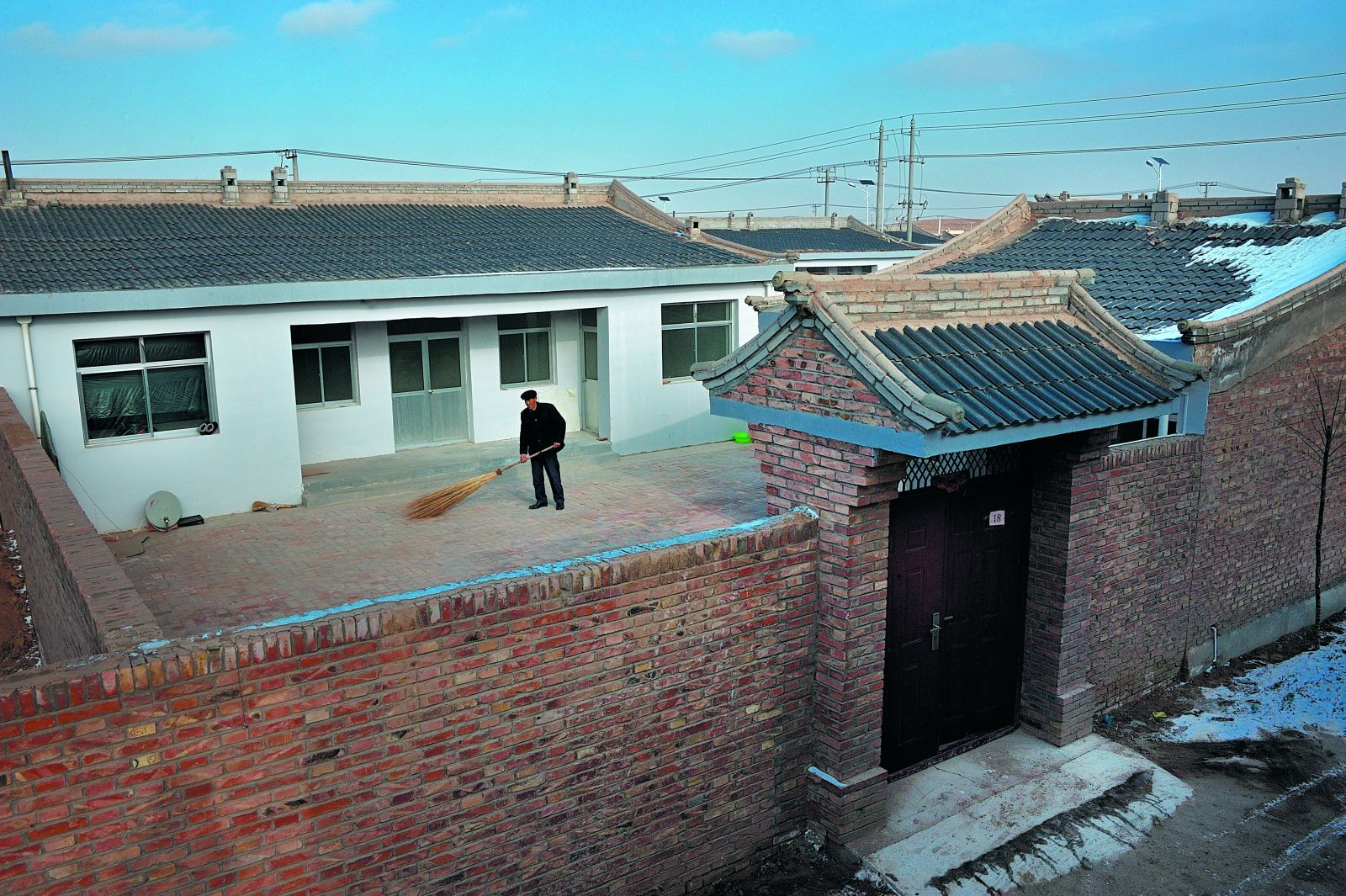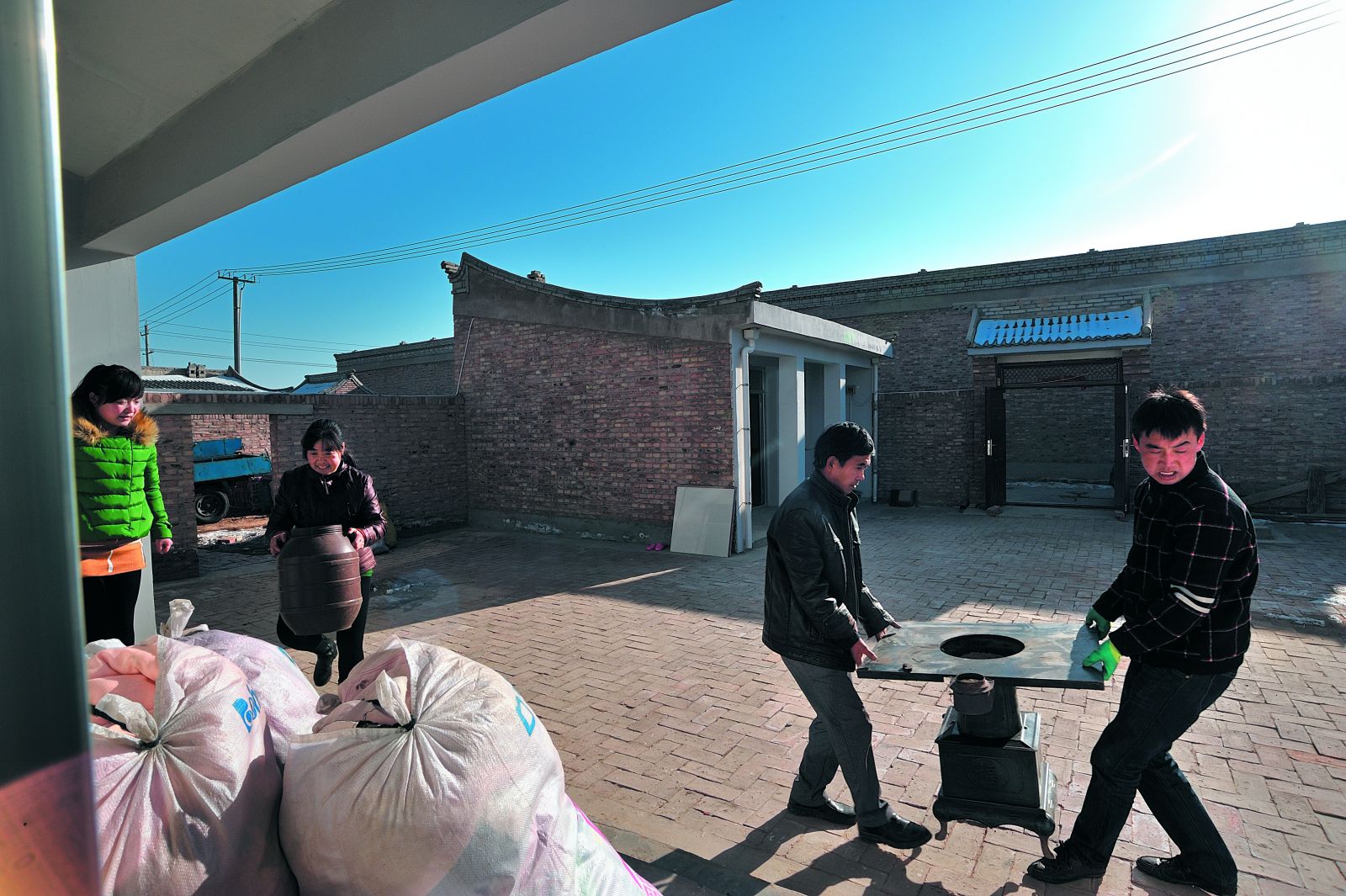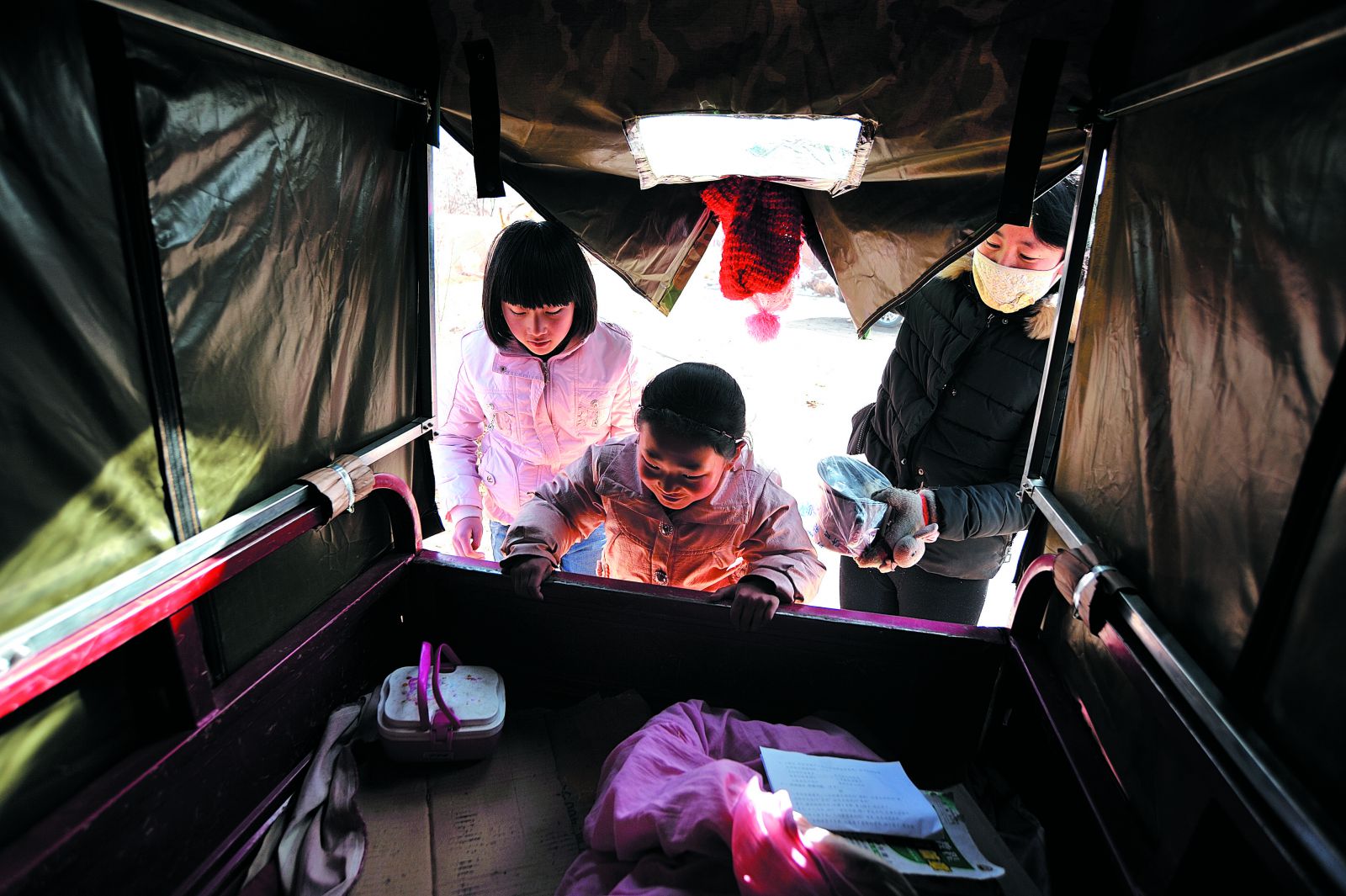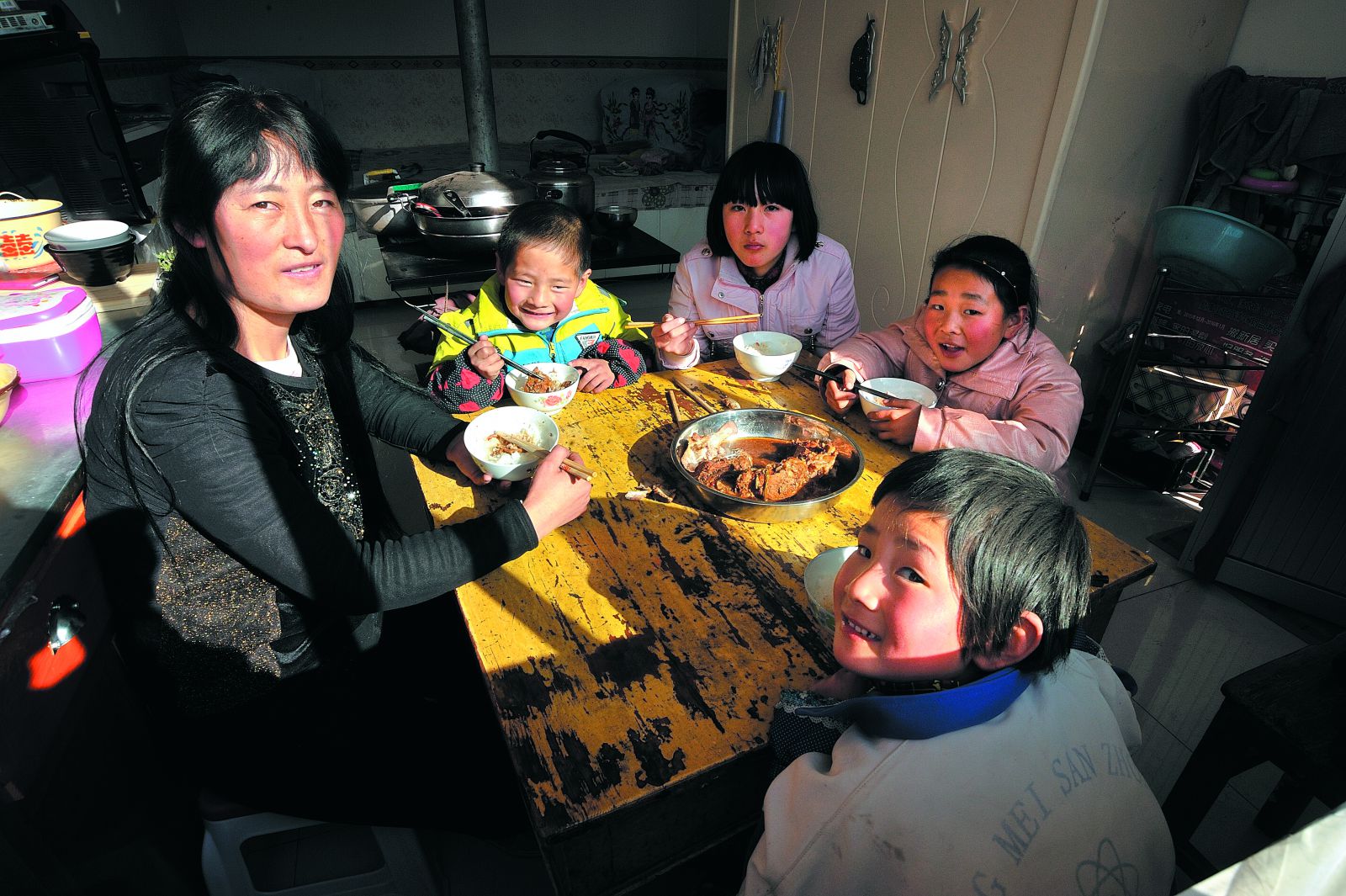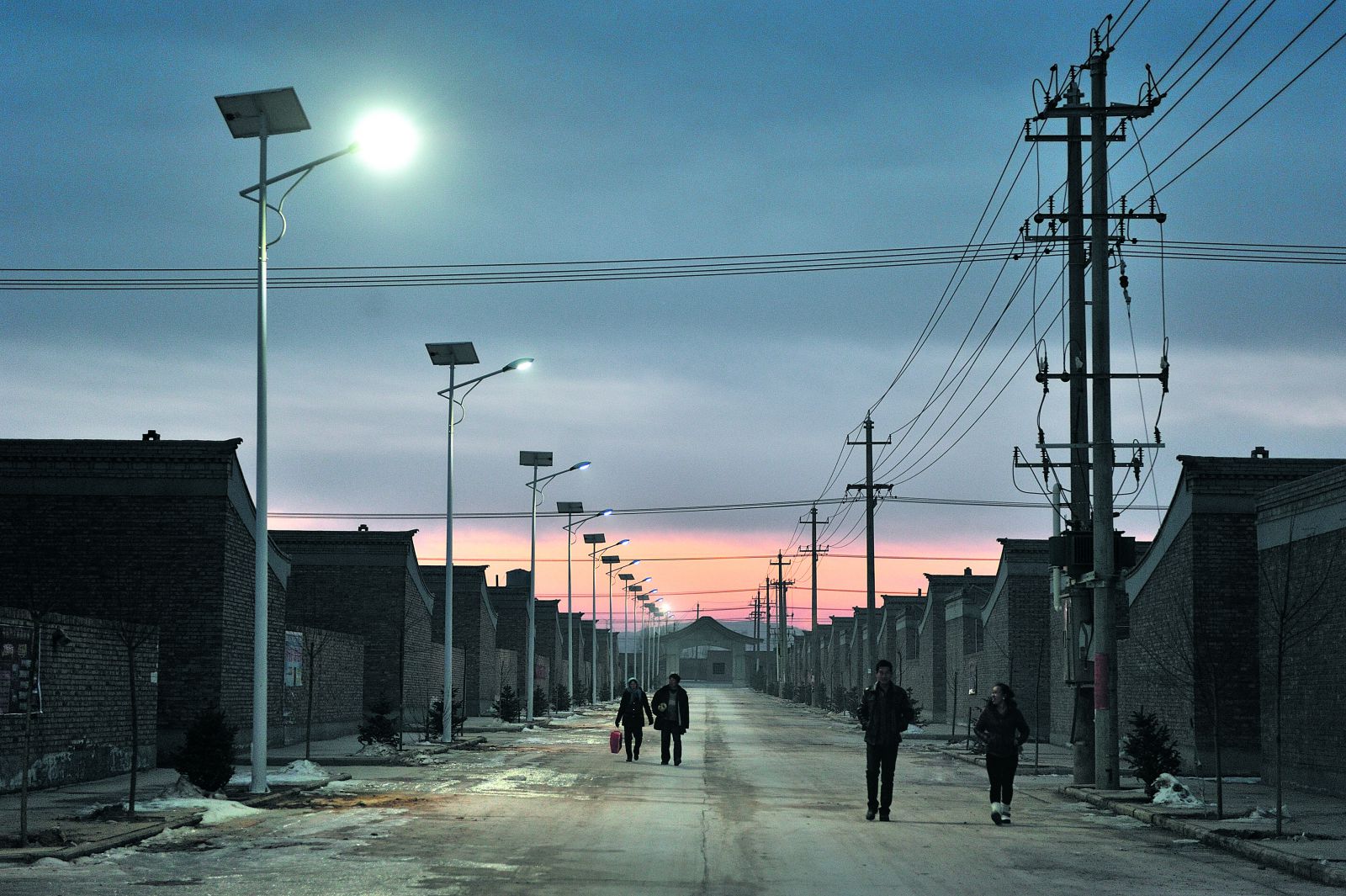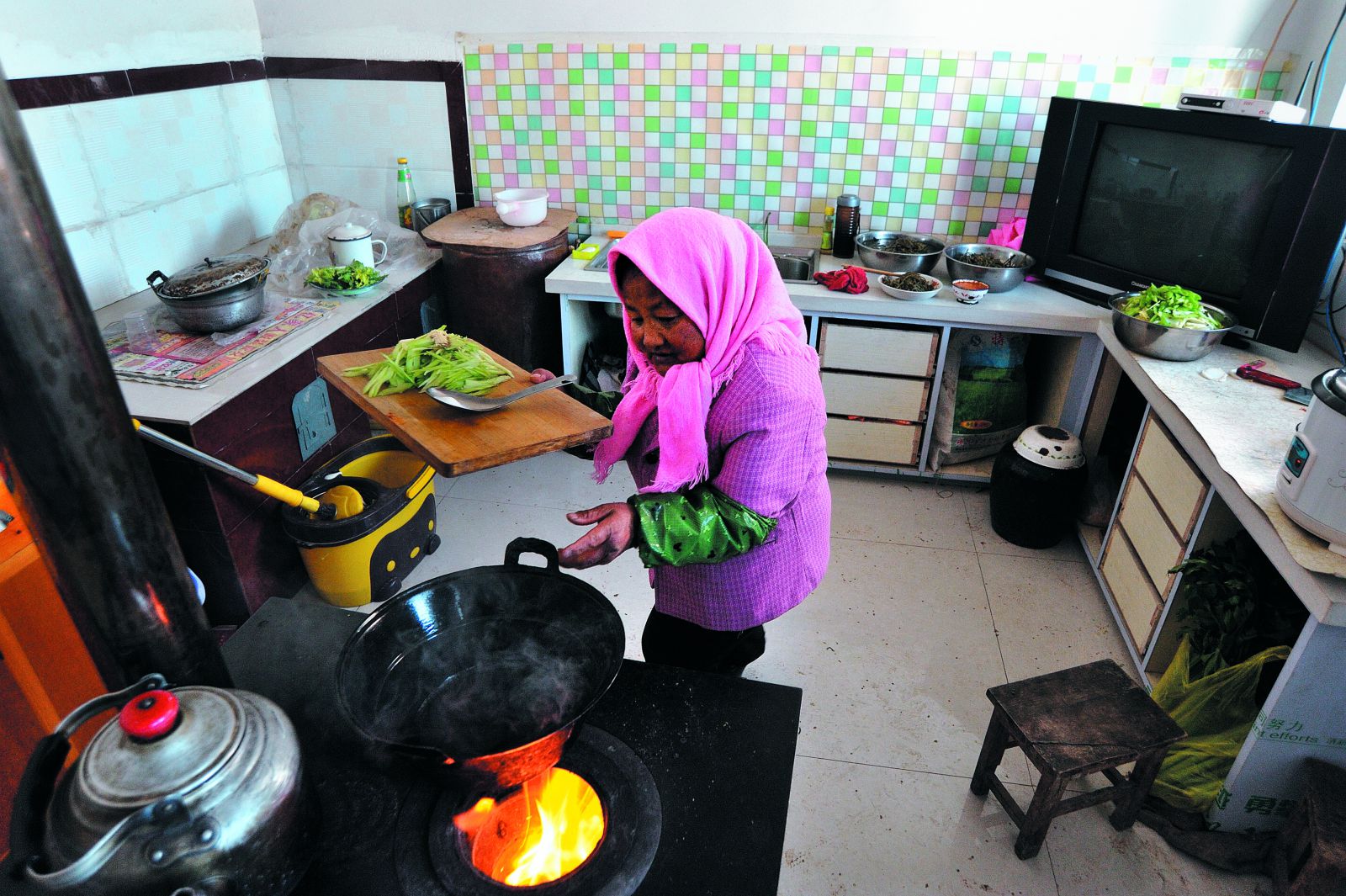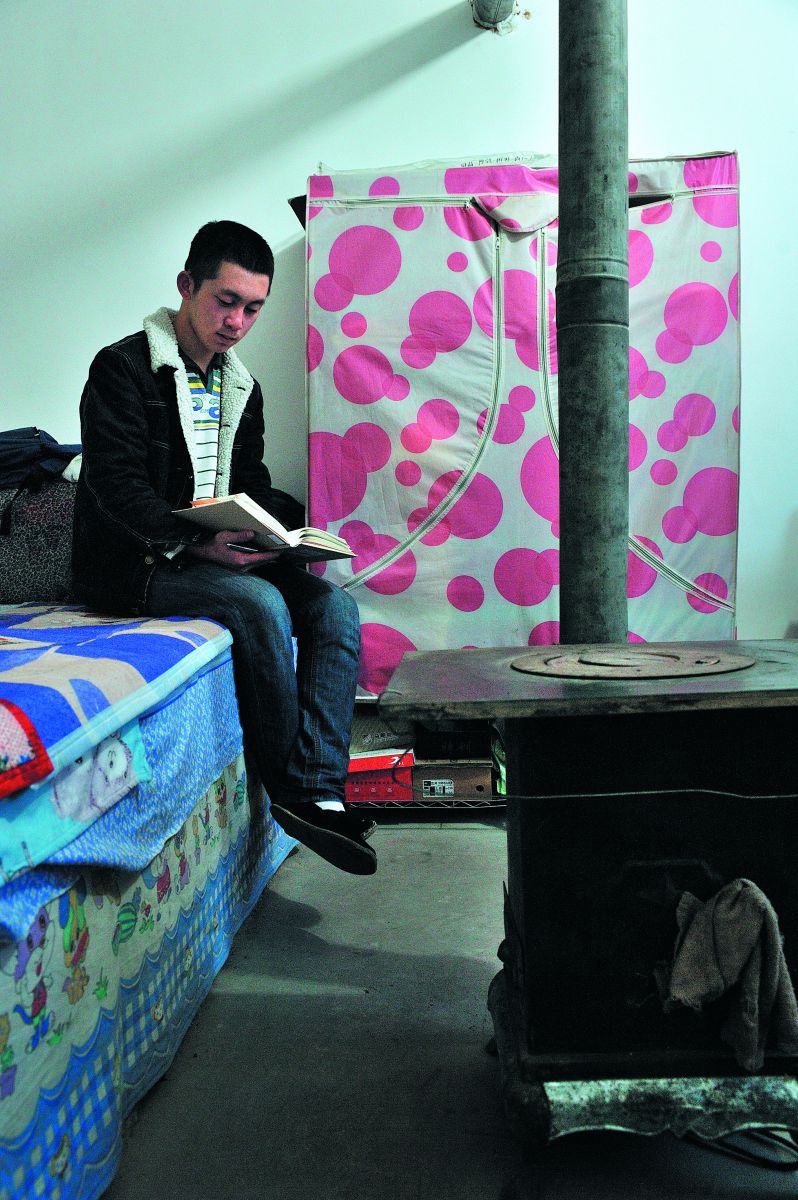

| New Homes, New Lives in Gansu | ||||||||||||||||
| By Yang Shun-bin, Translated by Tang Yau-yang, Photos by Huang Xiao-zhe | ||||||||||||||||
They move into their new homes in a newly built village, leaving behind their dwellings on the high land and a past that was difficult and water-deprived.
The construction of Baita Tzu Chi Village started in 2013. It is located in the town of Wuhe, Jingyuan County, Gansu Province, China. The village was the second phase of a project to relocate residents from water-deprived communities to more habitable sites. The village was completed in September 2015, with enough homes for 300 families. In November 2015, a drawing was held to distribute the units among the families. About a hundred families moved into their new homes in December. Others delayed their moves because road conditions had left them stranded in their old villages or they wanted to wait until the school semester had ended for their children. Chen Yuxue (陳玉學) moved after his second son, Chen Wenzhou (陳文舟), finished his term at school. They used a three-wheeled motorized vehicle to move their belongings to their new home. It took them several days to finish the move. They used to live an hour away in the village of Dawan, also in Wuhe. There they farmed and ran a grain processing plant. The plant and a drying field took up two thirds of an acre. They had taken out loans over time to purchase a grain grinder, a corn stalk grinder, and a noodle processing machine. Their fellow villagers had been their patrons, and with their business the family had been able to pay off all the loans and send three children to college. The Chens once had a fairly good life in Dawan, when the fields in their village still produced good yields. But times had changed, and now even this family had to leave. All the other families in the village had already gone; they were the last ones to do so. Of all the machines in their plant, they could only take the noodle machine with them. Without the plant and the income that it produced for the family, Chen Yuxue has had to borrow money so his children can stay in college. Their finances are very tight. They are even putting off things such as buying new curtains for their new home. Their children’s education is more important. Despite that, they remain optimistic. “We’re happy to move into our new home,” Chen declared. Though their house is quite austere in terms of furnishings, he and his family are hopeful that things will get better after this winter. The Chens have reason for hope in their new village.
Eco-immigrants Poor soil and little water once made Wuhe, where the new Tzu Chi village is located, a poor place for farming. In fact, the town was once the poorest in the region. But it has gotten a new lease on its economic life ever since the government began pumping in water from the Yellow River. With the newly available water, Wuhe residents have grown crops such as corn, onions, and wolfberries, thus improving their own lives and instilling new life into the town. Rising like a phoenix from the ashes of the loess, Wuhe was transformed from an agricultural no-man’s land into a place where it is easy to farm, find work, or do business. Anyone willing to work hard can expect economic rewards, including Chen Yuxue and his fellow residents at Baita Tzu Chi Village. Everybody has an equal shot at the prosperity that the town now affords every hard-working person—opportunities that they did not have before. The residents of the Tzu Chi village hail from six barren towns in Jingyuan County, including Shimen and Shuanglong near the Hasi Mountains. Drought had made agriculture difficult in those two towns, forcing many people to abandon farming in favor of raising goats. The animals are, however, hard on the land because they chew the grass down to the roots. The land, which already supported only sparse vegetation, could hardly withstand the onslaught of the animals and it became even more barren. That was what Wang Tuan-cheng (王端正), a Tzu Chi Foundation vice president, saw when he visited the area in 2012 to evaluate ways to help the destitute residents. The only way to help those people escape poverty and help the land at the same time was to relocate the villagers. That eventually led to the construction of Baita Tzu Chi Village. In a sense, the residents of the new village are “eco-immigrants.” The village was built on land provided by the government. The government also built the aqueduct that channels water from the Yellow River to the village, and it has made plans to distribute land to relocated villagers so they can carry on farming. Each house in the Tzu Chi village has three rooms, a kitchen, a livestock pen, and a courtyard. Tzu Chi provided the building materials, but the residents paid for the construction workers. After receiving confirmation of their residence in the new village, some would-be villagers even came and worked at the construction site to build their own future community.
Lu Shenfu Lu Shenfu (陸神福) and his family, from the village of Dawan, moved into their new home less than four days after the house was turned over to them. They hoped to settle in before winter arrived in full force. Lu’s daughter was getting married in just a few days. Home appliances in unopened boxes sat in the courtyard. They would be delivered to her husband’s home on the wedding day. Lu pointed out that Dawan started experiencing drought in 1982. It was quite severe—water had to be trucked into the area for household use. Lu had worked out of town for several years before returning to Dawan to marry. He, his wife, and other family members farmed 16.5 acres of land together. They thought that they could compensate for low yields by planting on more land. However, the drought year after year shattered their dreams. Their hard work could hardly sustain them. He wanted his children to go to school, so he left town again to make money. He joined his brother Lu Qifu (陸啓福) and worked in construction. They would find out where there was a government relocation project and go there to find work. When Lu learned that he would become a resident of Baita Tzu Chi Village, he and his wife went to work at the construction site. As a result, they witnessed how well the houses were put together. The blueprints for the village surprised and impressed Lu. The foundation for each family unit was dug deep, numerous steel reinforcing rods were embedded in the concrete, and each house had 19 earthquake-resistant pillars. Never before had Lu dreamed of living in a house of such high quality. Feeling grateful, he worked extra hard at the construction site. Gu Bingbo of the Tzu Chi Projects Office commented that the Baita project benefited from the construction experience of the first Tzu Chi village, in Liuchuan. Building on that experience, improved materials and construction methods were used for the newer village. For example, wood roofs were replaced by reinforced concrete because of the latter’s added stability and insulation, and rooms in each unit were partitioned differently to meet the needs of contemporary families: The less utilized main room in the middle was made smaller while the two side rooms that flanked the main room were enlarged. The houses were also designed to withstand magnitude 8 earthquakes. Lu has leased about 1.65 acres of land to grow corn. When the government distributes land to the relocated villagers, he plans to grow wolfberries. He is working and thinking hard to improve the financial well-being of his family.
Chang Jinhua Chang Jinhua (常金花) and her husband, Chen Tianlin (陳天林), moved to the new village from Kailong in the town of Jingan, about 20 miles away. Chen works in iron mining, so he is away most of the time. Chang takes care of everything at home. She was forced to quit school when she was in seventh grade, so it was all the more important to her that her children get a good education. There were no schools in Kailong, so she rented a place in another village, Changping, so that her four children could attend school there. The school was not very good—the teachers there could not even speak Mandarin well—but that was the best that Chang could do. That was why she transferred her children to Baita Elementary School in the middle of the semester, as soon as their new house at Baita Tzu Chi Village was turned over to them. Her children did not let her down at the new school. “They used to get 60s on their tests at the old school. Now, after only three weeks at the Baita school, they’re getting 90s.” Chang beamed, proud of her children. She said that her husband would stay at his mining job for now, given the uncertain job market. They plan to pay off within two years the government loan that they took out to pay the labor cost of their new home and to decorate it. After that, she hopes her husband will find a less hazardous job that is closer to home so the family can be together.
Lu Ming Lu Ming (路明) and his wife, Zhang Cunnan (張存男), have lived in their new home for a while, but the furniture in their bedroom is still brand-new. They have yet to sleep in their cherished new bed lest they should ruin its newness. Instead they sleep in the kitchen, which is common among the many other small families in the village. It is easier and less costly to heat the kitchen, a smaller space. Zhang is a dwarf. Over 20 years ago, she fell down a hill and broke her right leg and both hands. She did not go to see the doctor because she could not afford it. As a result, her right leg cannot bend now, and her hands cannot carry heavy loads. Lu, pushing 60, is almost deaf and dumb. Neither of them ever went to school. The couple hail from the village of Shuanglong, where they were shunned by their neighbors and relatives because of their disabilities. When their neighbors learned that they had gotten a house in the new Tzu Chi village, they commented scornfully that it must be some kind of scam. The couple, however, did not heed what they said. They had put up with enough disdain and snubs from their neighbors. They resolutely packed up and left.
The couple used to have a son. He had made good grades and gained admittance into a university in Guangdong Province. Sadly, the couple could not borrow enough money to let him attend that school, so their son gave up schooling and went to work in Qinghai, where he built train tunnels. He was a good son, and he called home often to check on his parents. He told them to be sure to eat enough, and he promised to take care of the bills when he got home. Seven years ago, Zhang received a phone call informing her that her son had died in an accident at work. She was devastated and felt that all hope had gone from her life. For a long time she locked herself in her room and did embroidering to heal her broken heart. A piece with embroidered peonies—her son’s favorite flowers—now hangs in the living room in their new home. When the couple still lived in their old village, Tzu Chi had distributed aid supplies to help them and other needy villagers. Now the foundation has helped build a new home for them. The couple is very grateful. Knowing that Tzu Chi is based in Taiwan, Lu gestured with his hands: “Taiwanese are wonderful people.” Back in their old village, they were designated as a destitute family eligible for government aid and subsidies. By moving to the new village, however, they lost their poverty designation and public assistance. Even so, they are not worried. They plan to farm the land that the government will be distributing to village residents, or they can pick wolfberries for other people. They will get by on their own strength. They believe that their future will be better than the life they left behind in Shuanglong. New houses stand one after another in Baita Village. Families like the Lus and Zhangs are settling in and looking forward to building a better future.
|













|

